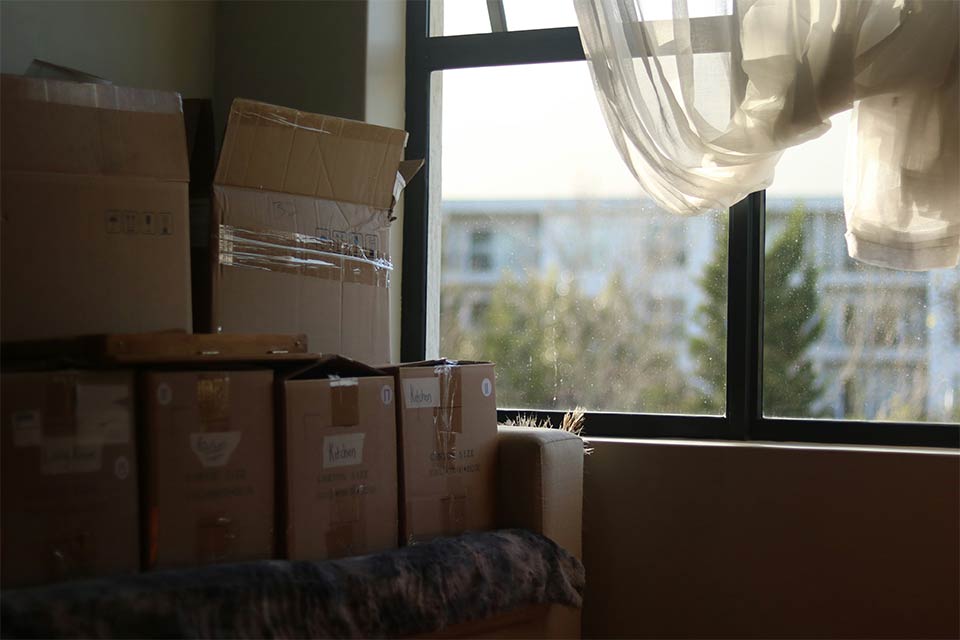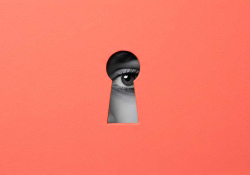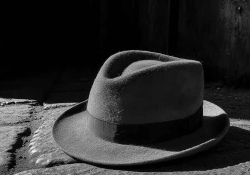Good Enough for Now (an excerpt)

When authorities take Penny Barnhill’s little girl, the single mother must get Phoebe back and find a way—despite being broke—to escape their shattered, bankrupt hometown for good. Standing in Penny’s way is her disability, a caseworker determined to keep Phoebe, Penny’s warring family, an unpredictable landlord, a manipulative boss, and a best friend she’s secretly in love with.
So this is where people come to live; I would have thought it is a city to die in.
– Rainer Maria Rilke, The Notebooks of Malte Laurids Brigge
Friday. Penny entered her new apartment for the first time. It was on the ground floor; the steel security door protected a scuffed coffin lid of black Masonite. Propping the doors open, she hoped a heavy dose of morning sunlight would free the trapped air and chase away the stale-milk fragrance of fresh paint. The apartment building lay alongside its twin—another two-story cement-colored structure with two units on each floor; windows on the lower levels of each wore a rib cage of protective bars. Entrances faced the street. A small parking lot separated the buildings and sidewalk; covered parking areas stood before each building, their faded white lines directing residents on the best way to park without striking buildings, wrought-iron fence, and other cars.
Before Penny entered, she met her new landlord, Charlene. Charlene handed over the keys and said: “You can put the deposit in the slot in my door.” Then she sneezed, sound scuffing walls, echoing in the empty room. Penny offered a tissue; the woman wiped a hand on the back of her blue cargo shorts instead, ducking her head under the door frame, edging a few feet outside, and then turning with a grimace. Charlene lived directly above and was the tallest person Penny had ever seen, with a belly stretching the fabric of her flag-length yellow basketball jersey. Charlene examined Penny. “You smoke?” she asked and quickly added, “No smoking.”
Penny avoided staring at the woman’s crowded orange teeth, observing her tracheotomy scar: a jagged crimson stripe curving downward from the pedestal of her throat like the exaggerated frown in a child’s drawing. Penny immediately recognized the scar, whose mark was more prominent than when they met last week. A cigarette lay behind Charlene’s ear, slightly bent as if put there in haste. Penny’s gaze landed on it briefly. She’d quit last year, though she still loved the smell of cigarette smoke.
Charlene studied Penny, memorizing her face: Penny’s short red hair, her large brown eyes, her pale, slender arms. The faded jeans and the black T-shirt she wore, the neck stretched like she’d put it on over a motorcycle helmet. Crouching and leaning forward, Charlene christened the room with another convulsive sneeze. Penny felt a light mist land on her right arm. She fought the impulse to quickly wash it off, standing there instead, watching her landlord, waiting for her to disappear. Charlene’s eyes grew as she remembered something. Digging in the pocket of her shorts, she retrieved a squarish, brown plastic puck and handed it to Penny. “Almost forgot. This is for the gate,” Charlene said. She ducked again on her way out of the room, returning upstairs, stomping. Penny listened, attaching new keys to her key ring, wondering if she’d always hear the woman coming and going. Then she looked around.
Advertised on Craigslist as a spacious one-bedroom creatively photographed to emphasize depth and contrast between eggshell paint and heather-gray carpet, Penny and her daughter Phoebe’s new apartment contained a single room, a kitchenette, and a cubicle accommodating toilet and shower. Penny was thankful previous tenants left their dented refrigerator behind. She wanted to bring fewer things with them this time—to relocate with less.
She’d already sold what she could to a thrift shop, giving away the rest. She brought her drum set. It could live in a corner. If monks crafted lives from essence, she and her daughter could, too. For years, she’d carried the drums from place to place. She fantasized about starting another band, but she wasn’t sure her new bandmates—when she found them—would have the patience necessary to watch her relearn her instrument. With every new place they moved to, there was the question of where the drums should go, like a piece of furniture no one uses.
If monks crafted lives from essence, she and her daughter could, too.
Their new apartment was within easy walking distance of her job at the dollar store. She could save the gas for trips to Phoebe’s school. Phoebe would begin preschool in September.
All Phoebe knew was a series of small Southern California apartments. Penny didn’t want these memories to block out the ones that mattered: the memories of love and connection. She didn’t want Phoebe’s life to become a history of the tiny places they inhabited together. The landlords, the neighbors. The noise of late-night parties and arguments. The gunshots, sirens, and helicopter blades stirring the air. Their new place was in a quieter part of town. The building across the street resembled a rec center. Or a church.
The desolate city always made her feel vulnerable; it made her think of the pistol. She didn’t know what to do with it, so she hid it in different places. The trouble, given her injury, was remembering where. That’s what her phone was for. Her memory had limitations and improved over the years, but she knew she needed a change. Her father, Frank, offered to enroll her at Valley College. He knew someone in admissions. But she didn’t need any help. She didn’t need to go back to school.
And she didn’t want the gun. Frank insisted she needed it. Especially now. He told her stories about late-night encounters downtown after work, showdowns in the dark, people following him as he drove home. “Better to have a gun and not need it than to need it and not have it,” he said, intentionally misquoting Richard Pryor in Car Wash, the seventies movie he watched again and again. Frank embroidered movie lines into his speech, even when he was serious. “You’ll feel safer. Just keep it away from your little girl.” For her little girl’s sake, she started a special journal, recording various hiding places for the gun over the years. The journal was safe inside her phone. She couldn’t forget the password if she tried.
Today—July 13th—was Phoebe’s birthday. After getting their stuff in the apartment, she would pick Phoebe up from her father’s and take her out for dinner. Phoebe could have anything. If she wanted dessert, she could have extra helpings. They’d probably see a movie later; if she wanted to see something Disney, no problem. It was Phoebe’s night.
She assumed Phoebe would ask why their new place was so small. She’d made one last trip inside their old apartment when they moved out. Shadows cut by doorways, a wayward cobweb suspended from the ceiling, dents in the carpet from furniture, the old place seemed to shrink when she’d removed everything from it, their whole life packed away in her little car and Myron’s truck.
The desolate city always made her feel vulnerable; it made her think of the pistol.
Myron poked his head in the doorway. His hands were full, and his face was already sweaty. They took turns shuttling boxes from his truck and her car. When they finished, she took his hand, placing a water bottle in it.
“What do you think?” she asked.
He wiped his forehead, twisting the cap, breaking the seal, and gulping. “It’s smaller than I thought.”
She said it was cheaper.
He said it oughta be.
“But I can walk to work now.”
“Nah,” he said, shaking his head. “I wouldn’t advise that.”
“It’s just up the street.”
“Still.”
“I’ll be fine,” she said, listening to the landlord walk around upstairs. “What’s wrong?”
“I had to take your beds apart,” he began, “and now I don’t—”
She told him not to worry about it. “I can put them back together before I get Phoebe.”
The phone vibrated in her back pocket.
He began to tell her he could figure it out but she stopped him. Holding the phone, she peered at the screen, not recognizing the number.
“Hello?”
“I’m looking for Penny Barnhill.”
A woman’s voice. Sounded official. Maybe it was corporate. Perhaps they wanted to talk about the complaint she lodged against her boss, Chad. Last month. After she showed a new hire around the store, Chad rubbed against her from behind, pushing his crotch into her ass. They were alone in the breakroom. It was late. Chad often flirted when they worked together, standing closer than necessary, bumping into her, making quiet comments about her red hair, wondering under his breath if she was a genuine ginger. Maybe they were calling to tell her they finally fucking fired him. Maybe they wanted to offer her his job.
“This is Penny,” she said, holding up a finger, mouthing one sec to Myron.
“Penny, this is Mrs. Lopez. I’m with the Department of Child and Family Services. I’m calling regarding your daughter Phoebe, who is currently in my custody.”
“In your—”
“Do you know a man by the name of Daniel Washburn?”
“What—”
“Do you know this man?”
Penny said yes.
“Mr. Washburn was found unconscious. Behind the wheel of an automobile. Arresting officers believe he was under the influence of opiates. Your daughter was in the backseat. Mr. Washburn was placed under arrest and charged with child endangerment. We have taken custody of your child.”
“Where is she?”
Myron asked what was wrong.
Mrs. Lopez took an exaggerated breath. “I told you. We have custody of your daughter. Are you at home at this moment? I need to come by and speak with you. I need your address, Miss Barnhill.”
“Is she okay!”
“Ma’am. I want you to listen to me. Give me your address. We will talk about your daughter.”
“Is she okay!”
“She’s fine. She’s in our custody. Now, I want your address. Be prepared to provide me with a urine sample. We are going to drug-test you as well.”
Penny stared at the wall as the voice’s gravity pressed her into it, enclosing her, evaporating the saliva in her mouth. Breaking free, she reached out to steady herself, knocking over a stack of boxes. She turned away from Myron, trying to focus, staring straight ahead, beyond her drum set. At eye level, an inscription in the wall had been painted over. The ridges remained. Someone carved a broken arrow there—and notches. She recognized the word: You.
Myron waved for her attention, the shadow of his arm flickering across the wall. Hearing the woman’s distorted voice over the phone, Penny’s heart became a fist. She asked the woman to repeat herself.
“What is your address?”
“I just moved in. I’m just moving my things in right now.”
“Have you been homeless?”
“Of course not,” she spat. “Why would you ask me that?”
“Because we’re concerned about the welfare of your child. Who was sitting in a car with a man clearly under the influence? A man who claims to be her father. Do you live with this man?”
“No, and he never sees her. Never. And he’s been bothering me, begging me to see her for months. And it’s her birthday, and I let her—”
“Sounds like you exercised some very poor judgment, Miss Barnhill. Now I need to come over—”
“When do I get to see my daughter?”
“We will discuss that when I come to your home.” Mrs. Lopez advised that she’d be coming with an associate. “We are going to investigate your place of residence. We’ll be initiating an action in the juvenile dependency court on Monday morning.”
“Please. I just want her back. What do you want me to do?”
“Give me your address.”
She did.
Mrs. Lopez knew the neighborhood. “An apartment.”
“Yes.”
“What number?”
Penny hesitated. “Number one.”
“You’re not sure where you live? When did you move in?
“A few minutes ago. I’m not even unpacked.”
“We’ll be by shortly. You can tell us all about it then,” Mrs. Lopez said, hanging up.
Seattle, Washington
Editorial note: From Good Enough for Now © 2024 by Jason M. Thornberry.















